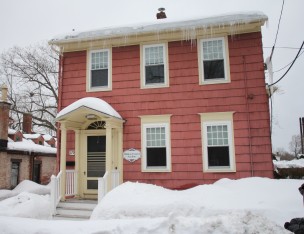Middlesex Transition Academy might be close by, but its work supporting students with disabilities has far-reaching effects.
Located on Court Street, just a few feet from the English Department building, the Middlesex Transition Academy (MTA) has a pink wood-frame base. It’s an establishment you might expect to provide afternoon tea rather than initiate social change, but don’t be fooled by its dainty exterior: the MTA means business.
When I arrived at the quaint building, Ann Mallin, the Program Coordinator of MTA, greeted me warmly at the door. As she led me to her office, she expressed how pleased she was to meet with me, and more importantly, how happy “the kids” would be when they saw an article about the Academy in print.
The program was first conceived in 2001 in partnership with the University. The federal government had distributed funds to start programs for students with disabilities from area school districts on college campuses. The Academy approached the University and was granted a space on campus for five years, free of charge.
Since then, the Academy has become a crucial social institution. In close partnership with the Middletown community, Regional School District 13, and the University, the program aims to help students with disabilities, ages 18 to 21, to gain independence and to smoothly transition into adulthood.
MTA offers its students a multifaceted educational curriculum. Chosen through a selective application process involving a series of tours, interviews, and evaluations, those enrolled at the Academy are not only instructed in various technological skills and academic areas, they are also given the tools to become self-reliant, confident, and active members of their respective communities.
The staff at MTA encourages students to learn more about their respective disabilities. As Mallin explained, the educators require them to create PowerPoint presentations each year describing the various aspects of their conditions and how those aspects might affect them and be accommodated.
“We do a lot of self-advocacy,” Mallin said. “They spend so much time in academics from K-12 that most students need to identify areas where they can improve and understand what they’re all about.”
After gaining a greater comprehension of their individual conditions, students apply what they’ve learned. Traveling to restaurants, banks, and recreational venues like the YMCA, they are encouraged to deposit checks, get change, order food, and make healthy social connections with the people of Middletown.
Students are also given the opportunity to undergo vocational training. As Alex Huffman, one of the Academy’s job developers and coaches, explained, enrollees are put through an interest inventory in order to determine their aptitude for certain skills and professions. Then, according to the results of the inventory, she and other coaches attempt to secure volunteer positions for them at various Middletown locations. Huffman said that some venues have historically been reluctant to get involved in the MTA program.
“[Businesses] are sometimes not so accepting, but usually once we explain the program and the students actually go in and work for them, they are a lot better about it,” Huffman said.
Mallin said that the venues on the University campus, such as Bon Appetit, Weshop, WesWings, and Red & Black Café have been perhaps the most effective vocational resource for the Academy.
“We have several employers on campus who have offered them job internships and have given opportunities to do career assessments,” Mallin said. “It’s been a very positive experience. They want to help. They’ve been very accepting.”
Aside from providing vocational positions, the University gives MTA students positive social outlets through Best Buddies, a program designed to promote interactions between people with and without disabilities.
“We’ve been involved [with Best Buddies] for the past 12 years,” Mallin said. “Best Buddies has lunch with our students at Usdan every day. They invite them to different events on- and off-campus. And they stop in here periodically—you know, just to spend social time with them.”
Citing the emotional and social benefits of the program, Huffman expressed a similar satisfaction with Best Buddies.
“This program being associated with a college campus has been really great for us,” she said. “I think it’s just wonderful that these students who may not get to go to college get that college experience. Just getting that college experience is wonderful.”
The MTA prides itself on providing possibilities for independence to individuals who might have otherwise led the rest of their lives in a state of dependency.
“When they first come to work with us, I don’t think they realize their own potential,” said Sean Reagan, one of MTA’s Special Education teachers. “So seeing them start at that point and then mature to come to the point where they graduate and see all the opportunities they have, to see the pride they take in their own growth, is absolutely wonderful.”
The results of the program are equally rewarding for the Middlesex staff. Each year, at the graduation held at the University’s Beckham Hall, all the students’ hard work comes to a conclusion that seems to remind each teacher and coach of their position’s value.
“I know it sounds corny, but seeing the growth that some of them made was completely overwhelming,” Reagan said, speaking of last year’s Commencement ceremony. “It’s all the time and energy the team put into it, that the family put into it, and the students, most importantly, put into it. I was really proud of them. It’s like a family here. We try to have as much discipline, as much effort, and as much fun as possible. That’s why we have staff that continues to work here and do what they do.”
